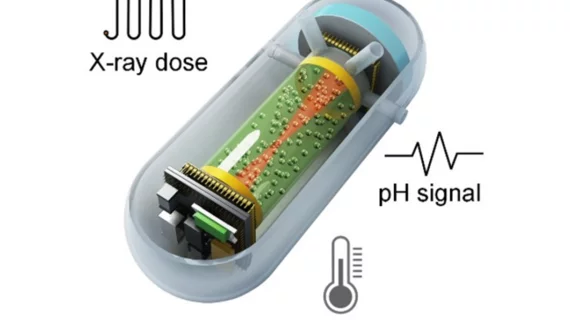Swallowable capsule monitors radiation dose in real-time during radiotherapy
Researchers have developed a new capsule that can accurately monitor radiation dose during radiation therapy in real-time.
The capsule is the result of a collaboration between Shenzhen Institute of Advanced Technology (SIAT) of the Chinese Academy of Sciences, the National University of Singapore (NUS) and Tsinghua University.
Coming in at a diameter of 5 mm and thickness of 0.2 mm, the swallowable X-ray dosimeter measures radiation dose up to five times more accurately than standard methods.
Experts involved in its development recently detailed their efforts in Nature Biomedical Engineering.
The monitoring device is made out of a biocompatible optoelectronic capsule that contains an optical fiber, lanthanide-doped persistent nanoscintillators, pH-sensitive polyaniline film and a compressed system that provides wireless readouts of luminescence. After being irradiated, the persistent luminescence of the nanoscintillators is used to monitor tumor pH without the need for external excitation.
Using a neural network-based regression model, the dosimeter measures radiation dose based on radioluminescence, afterglow intensity and temperature.
The capsule could be of particular benefit to patients undergoing radiation therapy for gastrointestinal cancers, as tissue of the GI tract is more vulnerable to the adverse effects of radiation. Thus far, it has been tested in the GI tracts of rabbits, but the team is hopeful that it will have utility for treating a variety of cancers in humans, corresponding author Zonghai Sheng, a professor with the Chinese Academy of Sciences, and colleagues implied.
“In the future, this capsule could be placed in the rectum for prostate cancer brachytherapy or in the upper nasal cavity for real-time measurement of the absorbed dose in nasopharyngeal carcinoma, minimizing radiation damage to surrounding structures,” the authors suggested.

